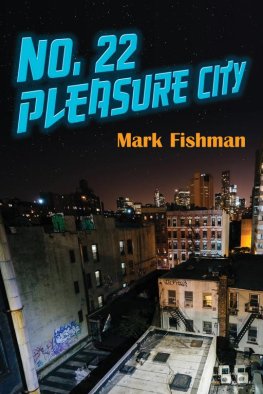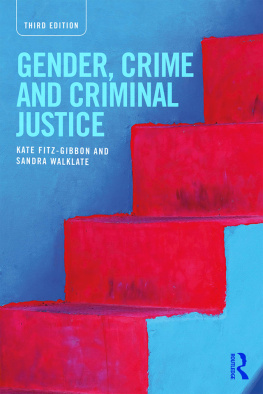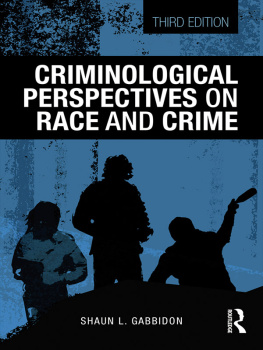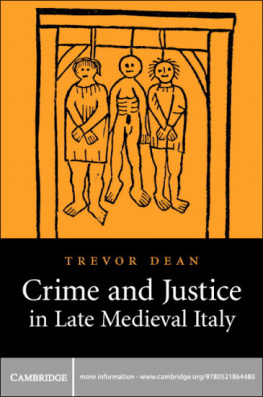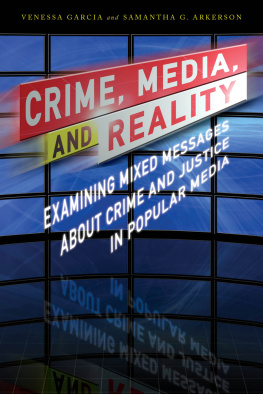
Entertaining Crime
SOCIAL PROBLEMS AND SOCIAL ISSUES
An Aldine de Gruyter Series o f Texts and Monographs
SERIES EDITOR
Joel Best
Southern Illinois University at Carbondale
Joel Best (editor), Images of Issues: Typifying Contemporary Social Problems (Second Edition)
Joel Best (editor), Troubling Children: Studies of Children and Social Problems
Anne E. Figert, Women and the Ownership of PMS: Structuring a Psychiatric Disorder
Mark Fishman and Gray Cavender (editors), Entertaining Crime: Television Reality Programs
James A. Holstein, Court-Ordered Insanity: Interpretive Practice and Involuntary Commitment
James A. Holstein and Gale Miller (editors), Reconsidering Social Constructionism: Debates in Social Problems Theory
Gale Miller and James A. Holstein (editors), Constructionist Controversies: Issues in Social Problems Theory
Philip Jenkins, Intimate Enemies: Moral Panics in Contemporary Great Britain
Philip Jenkins, Using Murder: The Social Construction of Serial Homicide
Valerie Jenness, Making It Work: The Prostitutes' Rights Movement in Perspective
Valerie Jenness and Kendal Broad, Hate Crimes: New Social Movements and the Politics of Violence
Stuart A. Kirk and Herb Kutchins, The Selling of DSM: The Rhetoric of Science in Psychiatry
John Lofland, Social Movement Organizations: Guide to Research on Insurgent Realities
Bruce Luske, Mirrors of Madness: Patrolling the Psychic Border
Leslie Margolin, Goodness Personified: The Emergence of Gifted Children
Donna Maurer and Jeffery Sobal (editors), Eating Agendas: Food and Nutrition as Social Problems
Gale Miller, Becoming Miracle Workers: Language and Meaning in Brief Therapy
Dorothy Pawluch, The New Pediatrics: A Profession in Transition
Erdwin H. Pfuhl and Stuart Henry, The Deviance Process (Third Edition)
William B. Sanders, Gangbangs and Drivebys: Grounded Culture and Juvenile Gang Violence
Theodore Sasson, Crime Talk: How Citizens Construct a Social Problem
Wilbur J. Scott, The Politics of Readjustment: Vietnam Veterans since the War
Wilbur J. Scott and Sandra Carson Stanley (editors), Gays and Lesbians in the Military: Issues, Concerns, and Contrasts
Malcolm Spector and John I. Kitsuse, Constructing Social Problems
Robert A. Stallings, Promoting Risk: Constructing the Earthquake Threat
Frank J. Weed, Certainty of Justice: Reform in the Crime Victim Movement
Rhys Williams (editor), Cultural Wars in American Politics: Critical Reviews of a Popular Myth
ENTERTAINING CRIME
Television Reality Programs
Mark Fishman and Gray Cavender
Editors
About the Editors
Mark Fishman is Associate Professor of Sociology, Brooklyn College, City University of New York. Dr. Fishman is the author of Manufacturing the News, and numerous journal articles related to crime news.
Gray Cavender is Professor, School of Justice Studies, Arizona State University. Dr. Cavender is co-author of Corporate Crime Under Attack: The Ford Pinto Case and Beyond.
First published 1998 by Transaction Publishers
Published 2017 by Routledge
2 Park Square, Milton Park, Abingdon, Oxon 0X14 4RN
711 Third Avenue, New York, NY 10017, USA
Routledge is an imprint of the Taylor & Francis Group, an informa business
Copyright 1998 by Taylor & Francis
All rights reserved. No part of this book may be reprinted or reproduced or utilised in any form or by any electronic, mechanical, or other means, now known or hereafter invented, including photocopying and recording, or in any information storage or retrieval system, without permission in writing from the publishers.
Notice:
Product or corporate names may be trademarks or registered trademarks, and are used only for identification and explanation without intent to infringe.
Library of Congress Cataloging-in-Publication Data
Entertaining crime : television reality programs / Mark Fishman and Gray Cavender, editors.
p. cm. (bocial problems and social issues)
Includes bibliographical references and index.
ISBN 0-202-30615-1 (alk. paper). ISBN 0-202-30616-X (pbk. : alk. paper)
1. Reality television programsHistory and criticism. 2. Crime in television. I. Fishman, Mark, 1947- . II. Cavender, Gray,
1947- . III. Series.
PN1992.8.R43E58 1998
364dc21
98-11941
CIP
ISBN 13: 978-0-202-30616-2 (pbk)
For Pam, Laura, and Nancy
Contents
Gray Cavender and Mark Fishman
Mary Beth Oliver and G. Blake Armstrong
R. Emerson Dobash, Philip Schlesinger, Russell Dobash, and C. Kay Weaver
Mark Fishman
Gray Cavender
Aaron Doyle
Pamela Donovan
Paul G. Kooistra, John S. Mahoney, and Saundra D. Westervelt
Dianne Cyr Carmody
Chris Brants
Hugh Dauncey
I
Introduction
1
Television Reality Crime Programs: Context and History
GRAY CAVENDER and MARK FISHMAN
Beginning in the late 1980s, a new trend appeared on television that has continued to the present: reality programs. There are a variety of these programs. Some, like "Geraldo," feature angry confrontations between former lovers or children who claim to be satanists. "Unsolved Mysteries" features segments on UFOs, the outlaw Billy the Kid, and crime. Others, programs like "America's Most Wanted," are only about crime. The chapters in this volume are about television reality crime programs.
Television programming can be divided into various genres or categories. For example, TV programs could be categorized as situation comedies, police shows, science fiction series, news, talk shows, or game shows. A simpler way of categorizing programs is to make a distinction between fact and fiction. Programs like "The X-Files" or "Seinfeld" are fictional, while "The CBS Evening News" and news magazines like "60 Minutes" claim to present information about real people and events. Other programs are somewhere between TV fiction and the reality of the news. Game shows and late night talk shows (e.g., Letterman and Leno) are not fiction, but neither are they the news; they are entertainment programming.
Television reality programs are especially hard to categorize because they blur the line between news and entertainment; some even blur the line between fact and fiction. Programs like "Flard Copy" cover real people; often these are celebrities, although occasionally, as in the coverage of the O. J. Simpson trial, stories are about celebrities and crime. Programs like "Rescue 911" and "America's Most Wanted" reenact actual events.


